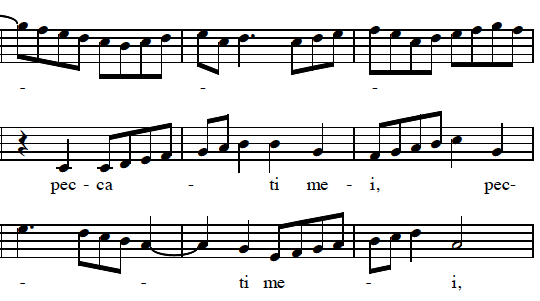Psalm 32 is one of the psalms of penitence (the second after Ps. 6; this theme takes up the first half of the song), but also of refuge — “You are my hiding-place” (vv. 6 -7). Then it changes direction, breaks into other riffs of guidance or wisdom (8-9) and finally thanksgiving. Of the seven traditional penitentials, David in this song is particularly conscious of personal failings, confession and forgiveness. A tweet by Ben Myers summarising the psalms captured it cleverly with a positive twist:
Psalm 32: When I finally got the courage to confess my sins, I discovered You weren’t even listening. You were singing to me. #psalmtweets
A woman’s touch
Ideas herein other than penitence are worth consideration. Never far from the psalmists’ pens are thoughts of refuge, wisdom and guidance. Sometimes, refuge is presented as a shelter from violent conflict. Here, David says: “You are my hiding place; you preserve me from trouble”, (verse 7) then goes on to relish divine guidance, (8) and understanding. (9) More often in the highways and byways, relief from hunger, poverty, oppression and homelessness are far more relevant. There’s no vector in this psalm to point us directly to International Women’s Day which will be celebrated about the time this psalm arises in the Lectionary. However, women have often been primary agents for refuge and guidance to the young, penitents and destitute over the centuries.

The psalms give little prominence to women. However they do recognise images of God as feminine spirit and creator, as well as ideas of mothering or midwife (22:9, 113:9, 127), the prophetic (68:11) and other female influences. This includes the provision of shelter and care (22:9-10) as beautifully seen in the ancient Beguinale women’s order and their houses of refuge and faith in older European cities. Psalm 131 sounds as though its author may well have been a woman. Her experience of the divine is described as relating directly to a mother rather than father, affirming the mother’s strong and beautiful role in nurturing confident, content and independent children.
On the other hand, the psalms omit some courageous women when equivalent male prophets are mentioned by name (Miriam in Ps. 99). Pity, but perhaps this just reflects the pattern of other records and writings in those early cultures when men wrote the poetry, policy and history. This is no reason to discount this ancient poetry. An inclusive linguistic, contextual and poetic interpretation — and recalling the esteem with which Jesus regarded women as recorded in John’s gospel — helps balance and fill in the gaps for modern sensibilities.
Music
Modern sources (other than TiS, whose setting in No 20 can not be recommended for its hymn format and dated language and style) recognise that ‘Penitential’ is just a label obscuring many more varied ideas which, while not overtly feminist, support themes of strength, nurturing, guidance and shelter:
- Psalms for All Seasons suggests You are my hiding place, which many more demonstrative groups will enjoy.
- The guidance thread in verse 8 emerges in The Emergent Psalter, a very memorable and lilting Isaac Everett antiphon that will easily conjure up a mother’s watchful coaching: “Show me which way to go, counsel me with your eye upon me.” Everett has the chords slipping easily from minor to relative major sequences and back again in a short space.
- NCH, commended for its broadly inclusive approach, offers a simple antiphon from a woman’s pen (Emma Lou Diemer, 1994) that emphasises surrounding love.
If a few good sight-readers are available, two short trios are worth a look:
- Orlando di Lasso, Dixi confitebor, verse 5 only; starts simply but becomes more complex; an excerpt is shown in the illustration. Readers may recall that Lassus wrote a famous and much more ambitious set of Penitential Psalms, including this one.
- Thomas Tomkins, Blessed is he, verses 1 and 2.
Note for SWUC: no sung psalm as we enjoy a Shaker song, ‘Simple gifts’.


2 thoughts on “Psalm 32, 5 March 2017”